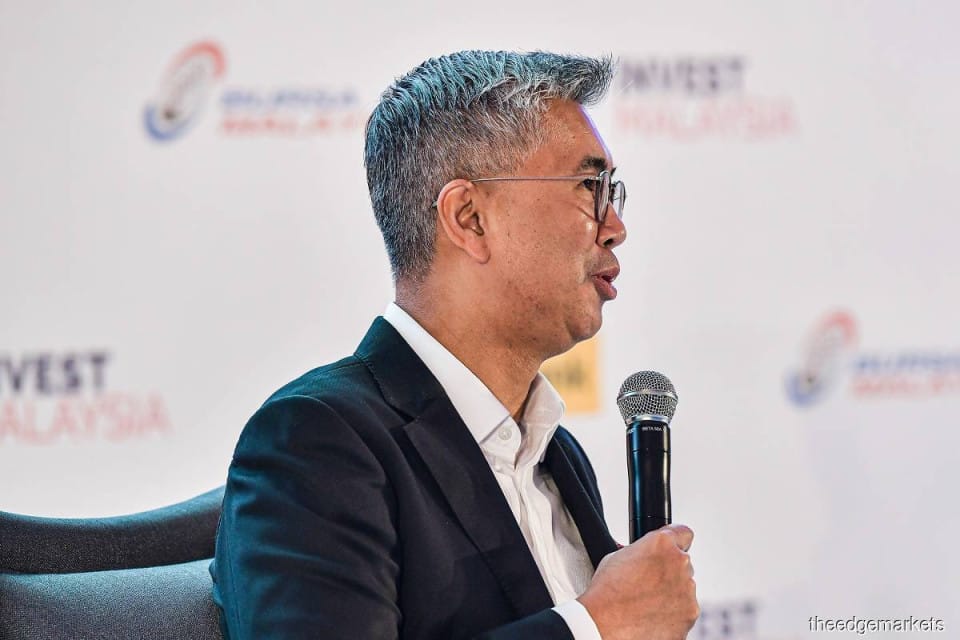KUALA LUMPUR (March 8): Malaysia’s approved investments amounted to RM264.6 billion in 2022, with the services sector accounting for the largest share of the pie, followed by the manufacturing and primary sectors.
The services sector saw approved investments totalling RM154 billion or 58.2% of the total approved investments for the year.
Meanwhile, approved investments in the manufacturing sector stood at RM84.3 billion (31.9%) and primary industry at RM26.3 billion (9.9%), said International Trade and Industry Minister Tengku Datuk Seri Zafrul Abdul Aziz.
He noted that the total approved investments were the second-largest print ever recorded after 2021.
“There were two large one-off investments that happened in 2021 from Intel and China’s Risen Energy Co Ltd,” he told reporters during the Malaysian Investment Development Authority (Mida) media conference on Malaysia’s investment performance for 2022.
Earlier in his speech, Tengku Zafrul said foreign direct investments (FDIs) accounted for 61.7% or RM163.3 billion of the total approved investments, while domestic direct investments (DDIs) contributed 38.3% or RM101.3 billion.
He added that last year’s approved investments are expected to create 140,370 jobs in the country.
China accounted for the biggest FDIs at RM55.4 billion, followed by the United States (RM29.2 billion), the Netherlands (RM20.4 billion), Singapore (RM13.5 billion) and Japan (RM11.4 billion).
A large proportion of the approved investments took place in Johor (RM70.6 billion), followed by Selangor (RM60.1 billion), Sarawak (RM28.2 billion), Kuala Lumpur (RM25.0 billion) and Penang (RM16.3 billion), he said.
“This must be improved further in the near future, especially with our renewed focus on an effective economic policy, favourable investment environment, political stability, and more coordinated investment promotion by all agencies, both at the federal government and state levels,” Tengku Zafrul said.
In his speech, Tengku Zafrul highlighted that Malaysia’s New Investment Policy reforms are consistent with the 12th Malaysia Plan (12MP), which is aimed at resetting the nation’s economy by enhancing security, promoting well-being and inclusivity, and advancing sustainability.
“Malaysia is also putting in all efforts to emerge rapidly as Asean’s digital hub, driven by several key factors, including its highly developed information and communications technology infrastructure, strong intellectual property protection framework and talent pool,” he said.
Tengku Zafrul said the International Trade and Industry Ministry (Miti)’s “Academy in Factory” initiative under Budget 2023 will also ensure a steady stream of skilled labour that matches industries’ needs.
“Such measures will continue to make Malaysia an appealing destination for businesses looking to expand their digital capabilities and regional footprint,” he said.
As for the investment outlook for 2023, he said the moderation in global economic growth may impact investment decisions globally.
“The International Monetary Fund (IMF) and the World Bank projected a positive but slower economic growth compared to the previous years, so investments will also be impacted, as it also depends on demand.
“Investment decisions are a little different from trade as (they are) based on long-term plans. The important thing is the country’s fundamentals,” he said.
Tengku Zafrul added that despite global challenges such as inflationary pressures, economic uncertainty, and climate change, Malaysia’s economy is expected to remain resilient this year.
He noted that the World Bank has forecasted a positive outlook for Malaysia, with an estimated growth rate of 4.0%, while the IMF is anticipating a growth of 4.4%, which is in line with the government’s recent growth forecast of approximately 4.5%.
“In addition to our ongoing targeted trade and investment missions, we have continued to take part in multilateral free trade agreements such as the Regional Comprehensive Economic Partnership (RCEP) and the Comprehensive and Progressive Agreement for Trans-Pacific Partnership (CPTPP).
“This will increase investors’ confidence in our country and in turn, enhance the livelihoods of Malaysians and the business communities,” he said.
Source: The Edge Markets https://www.theedgemarkets.com/node/658263























